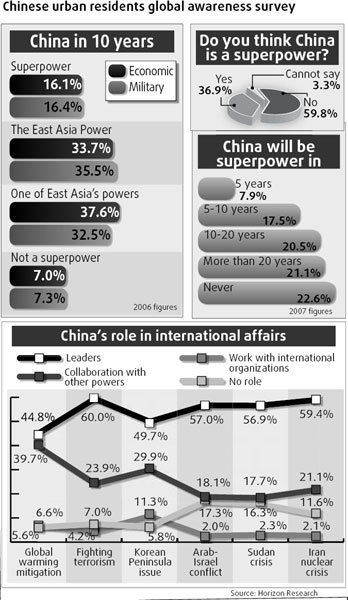From hosting the Olympics to the planned launch of the Shenzhou VII manned spacecraft, many Chinese are seeing the year as one with national achievements they can be proud of.
Still, despite booming economic growth and influence over the past three decades, many Chinese do not consider the country a world superpower, a recent survey has showed.
The survey, by social research company Horizon Research, polled more than 3,000 residents in 10 cities including Beijing, Shanghai and Guangzhou.
Close to 60 percent of those polled thought the country should strengthen collaboration with international organizations or other countries in a wide range of global issues - as a supporter or coordinator rather than a leader.
About six in 10 said they did not consider the country as a superpower, while about 22 percent said the country will never become one.

Another 20 percent said the country's journey to becoming a superpower would take more than two decades.
"It is a very normal attitude among Chinese citizens, to actively participate in international affairs, but not necessarily to do so as the leader," said Wang Yizhou, deputy director of the Institute of World Economics and Politics under the Chinese Academy of Social Sciences (CASS).
"The Chinese people wish for their government to work with other countries to achieve global objectives, but they don't want to become the flag-raiser."
Wang said such a mentality is a legacy of former State leader Deng Xiaoping, whose foreign policy, put forward three decades ago when the country started on its opening-up and reform, has been carried on by his successors.
"According to Deng's theory, when it comes to foreign policies, China is to participate, not to lead, not to have enemies," Wang said.
The approach has had profound influence on many Chinese politicians, think tanks and the public, Wang added.